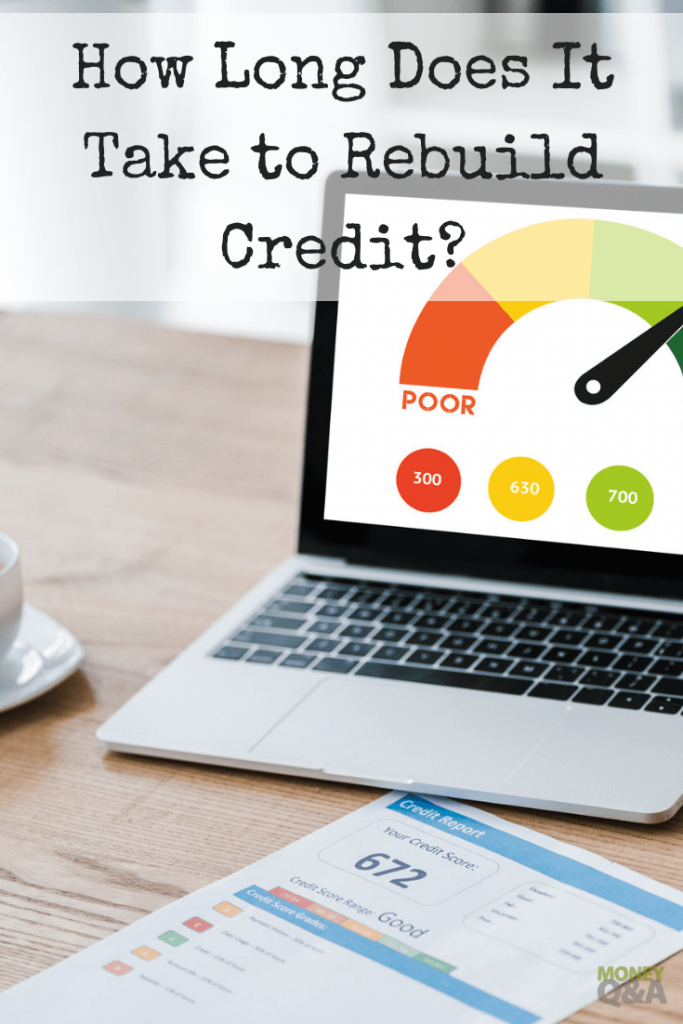
If you’ve gone through a rough few months (or years) and your credit score has taken a serious hit as a result of problematic spending, missed payments, too much debt or other common financial problems, then you’re not alone. As many as 12% of Americans have credit scores lower than 550 and over 50 million Americans don’t have a credit score at all.
Of course, shared credit woes are not valid reasons for sitting back and doing nothing while your credit score plunges into the “fair” or “poor” ranges. Instead, you should do everything possible to get that score back into the good/excellent ranges. How long will it take you to get back into “safe” credit score territory? Let’s explore how long it takes to rebuild credit:
One Month
Nobody can make a drastic improvement to their credit score in just one month (unless perhaps you win the lottery and pay off several thousands of dollars of debt – even then, there’s no guarantee of a skyrocketing credit score increase and closing accounts like student and auto loans can actually hurt your credit score in the short-run).
However, you can expect to see some marginal improvements to your score over the course of a few weeks if you make considerable progress on repaying your loans, lowering the remaining principal amounts, maintaining a timely payment record and applying for new lines of credit sparingly.
You could also potentially increase your credit score by asking your lenders for higher credit limits (don’t do this unless you haven’t received a credit line increase in several months/years and you have sufficient income and a solid track record of on-time payments to demonstrate your worthiness as a responsible borrower).
3-12 Months
It’s certainly possible to see a substantial change in the 3-12 month period after you start getting serious about rebuilding your credit. If you have fair or poor credit (score of 659 or lower) and start making big changes like consistently meeting payment deadlines, paying off more than the minimum amount due, and keeping your oldest accounts open (length of credit history is a huge factor in calculating your score), then you can likely expect to see a faster increase than someone who already has good credit.
As with many things in life, it’s easier to fall than it is to get back up, so remain patient during the credit rebuilding process even when feelings of frustration creep up after putting in a lot of effort for seemingly little results (your credit score will bounce back…in time).
Two Years
The two-year mark is significant when it comes to building (and rebuilding) credit because this is how long it takes for a hard inquiry on your credit report to go away. Hard inquiries come from landlords, creditors, lenders and other authorized organizations that pull your credit report, such as when you apply for a new credit card, loan or home to rent.
There’s nothing wrong with having a couple hard inquiries on your credit report – these don’t impact your score as significantly as other factors do – but having 4-6+ hard inquiries within a two-year timeframe can ding your score a bit, so be sure to apply for loans/credit cards only when absolutely necessary.

Several Years
In some cases, it can take years to rebuild your credit score. If you are drowning in debt and/or declared bankruptcy recently, then you may not see a substantial credit improvement for 7-10 years (depending on which chapter of bankruptcy you filed for). Folks with little to no credit history will also notice it takes quite some time to develop a credit history, as credit reporting bureaus are strongly influenced by the average length of your open accounts and general credit history.
This means that opening several cards in a short timeframe could significantly reduce your average credit lifespan and it’s important to remember that this category in particular (length of credit history) takes several years before it has a positive impact on your credit score.
How to Rebuild Credit
If you’re ready to get serious about rebuilding your credit score, then there are several strategies you can try:
- Review your credit report for possible errors and dispute anything suspicious
- Ask for a credit limit increase (this subsequently reduces your credit utilization ratio, as long as you don’t add more debt to your credit cards in the meantime)
- Pay off a balance in full but maintain the credit card with a small, recurring monthly payment
- Open a charge card so you can use credit responsibly while paying off each balance in full at the end of each statement period
- Transfer a balance from a high-interest card to a 0% introductory APR card or otherwise low interest card (this will make it easier to pay off debts faster)
- Become an authorized user on another person’s card (only do this if you both strongly trust each other)
As you can see, there are plenty of options for repairing and rebuilding your credit. It will take time – months or years, depending on your current situation – but the benefits of having a high credit score will make the time and effort you dedicate to this credit restoration process worth it in the end.

